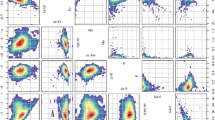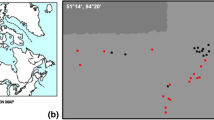Abstract
This paper presents a regionalized method for the estimation of a favorability function through generalization of all relevant variables (explanatory and target) into random functions. The new method allows the use of cross-covariance functions in addition to ordinary covariances for extracting spatial joint information, which is virtually overlooked in the conventional analyses. The optimal weights for a favorability equation are derived from solving a generalized eigen-system established by the maximization of covariances between a favorability function and the principal components of a set of pre-selected target variables. Various correlation coefficients may be computed to assist in interpretation of the favorability estimates. Both favorability functions and correlation coefficients may be estimated for a point or a block. The regionalized favorability theory can be compared to cokriging in that both use the sample-sample covariances to account for the sample-sample relations and the point-sample covariances to account for the point-sample configurations. The new technique is demonstrated on a test case study, which involves the integration of geochemical, airborne-geophysical, and structural data sets for the target selection of hydrothermal gold-silver deposits.
Similar content being viewed by others
References
Agterberg, F. P., 1989, Computer Programs for Mineral Exploration: Science, v. 245, p. 76–81.
Agterberg, F. P., 1992, Combining Indicator Patterns in Weights of Evidence Modeling for Resource Evaluation: Nonrenewable Res., v. 1, p. 39–50.
Agterberg, F. P., Bonham-Carter, G. F., and Wright, D. F. 1990, Statistical Pattern Integration for Mineral Exploration,in G. Gaál and D. F., Merriam (Eds.), Computer Applications in Resource Exploration, Prediction, and Assessment for Metals and Petroleum: Pergamon, Oxford, p. 1–21.
Botbol, J. M., Sinding-Larsen, R., McCammon, R. B., and Gott, G. B., 1978, A Regionalized Multivariate Approach to Target Selection in Geochemical Exploration: Econ. Geol., v. 73, p. 534–546.
Carr, J. R., and McCallister, P. G., 1985, An Application of Co-Kriging for Estimation of Tripartite Earthquake Response Spectra: Math. Geol., v. 17, p. 527–545.
Carr, J. R., Myers, D. E., and Glass, C. E., 1985, Co-Kriging—A Computer Program: Comp. Geos., v. 11, p. 111–127.
Chung, C. F., and Agterberg, F. P., 1980, Regression Models for Estimating Mineral Resources from Geological Map Data: Math. Geol., v. 12, p. 473–488.
Clark, I., Basinger, K. L., and Harper, W. V., 1989, MUCK—A Novel Approach to Co-Kriging:in B. E. Buxton (Ed.), Proc. of the Conf. on Geostatistical, Sensitivity, and Uncertainty Methods for Ground-Water Flow and Radionuclide Transport Modeling: Battelle Press, p. 473–493.
David, M., 1977, Geostatistical Ore Reserve Estimation: Elsevier, New York, 364 p.
Davis, B. M., and Greenes, K. A., 1983, Estimation Using Spatially Distributed Multivariate Data—An Example with Coal Quality: Math. Geol., v. 15, p. 287–300.
Davis, J. C., 1986, Statistics and Data Analysis in Geology, 2nd ed.: John Wiley & Sons, New York, 646 p.
Fraser, D. C., 1978, Resistivity Mapping with an Airborne Multicoil Electromagnetic System: Geophysics, v. 43, p. 144–172.
Fraser, D. C., 1990, Layered-Earth Resistivity Mapping: U.S.G.S. Bull., Dec., p. 33–41.
Harris, D. P., 1984, Mineral Resources Appraisal: Oxford University Press, London, 445 p.
Harris, D. P., and Pan, G. C., 1987, An Investigation of Quantification Methods and Multivariate Relations Designed Explicitly to Support the Estimation of Mineral Resources—Intrinsic Samples: Report on Research Sponsored by U.S. Geological Survey Grant No. 14-08-0001-G1399, 200 p.
Harris, D. P., and Pan, G. C., 1990, Intrinsic Sample Methodology,in G. Gaál and D. F. Merriam (Eds.), Computer Application in Resource Exploration, Prediction, and Assessment for Metals and Petroleum: Pergamon, Oxford, p. 53–74.
Hohn, M. E., 1988, Geostatistics and Petroleum Geology: Van Nostrand Reinhold, New York, 264 p.
Isaaks, E. H., and Srivastava, 1989, An Introduction to Applied Geostatistics: Oxford University Press, New York, 561 p.
Johnson, R. A., and Wichern, D. W., 1988, Applied Multivariate Statistical Analysis: Prentice Hall, 607 p.
Journel, A. G., and Huijbregts, C. J., 1978, Mining Geostatistics: Academic Press, London, 600 p.
Kirsch, Ch., and Pawlowsky, U., 1985, Modelisation de Variogrammes Croises: Comment Satisfaire á l'Inegalite de Cauchy-Schwartz: Sci. Terre, v. 24, p. 53.
Luo, J., 1990, Statistical Mineral Prediction Without Defining a Training Area: Math. Geol., v. 22, p. 253–260.
Marcotte, D., 1991, Cokriging with Matlab: Comp. Geosci., v. 17, p. 1265–1280.
McCammon, R. B., Botbol, J. M., Sinding-Larsen, R., and Bowen, R. W., 1983, Characteristic Analysis—1981: Final Program and a Possible Discovery: Math. Geol., v. 15, p. 59–83.
Myers, D. E., 1982, Matrix Formulation of Co-Kriging: Math. Geol., v. 14, p. 249–257.
Myers, D. E., 1983, Estimation of Linear Combinations and Co-Kriging: Math. Geol., v. 15, p. 633–637.
Myers, D. E., 1984, Co-Kriging—New Development:in G. Verly et al. (Eds.), Geostatistics for Natural Resources Characterization: D. Reidel, p. 295–305.
Myers, D. E., 1988a, Multivariate Geostatistics for Environmental Monitoring: Sci. Terre, v. 27, p. 411–428.
Myers, D. E., 1988b, Interpolation with Positive Definite Functions: Sci. Terre, v. 28, p. 251–265.
Myers, D. E., 1991, Pseudocross-Variograms, Positive Definiteness and Cokriging: Math. Geol., v. 23, p. 805–816.
Pan, G. C., 1989, Concepts and Methods of Multivariate Information Synthesis for Mineral Resources Estimation: Ph.D. dissertation, University of Arizona, Tucson, 302 p.
Pan, G. C., and Harris, D. P., 1990, Three Nonparametric Techniques for Optimum Discretization of Quantitative Geological Measurements: Math. Geol., v. 22, p. 699–722.
Pan, G. C., and Harris, D. P., 1992a, Estimating a Favorability Equation for the Integration of Geodata and Selection of Mineral Exploration Targets: Math. Geol., v. 24, p. 177–202.
Pan, G. C., and Harris, D. P., 1992b, Decomposed and Weighted Characteristic Analysis for the Quantitative Estimation of Mineral Resources: Math. Geol., v. 24, p. 807–823.
Pan, G. C., and Wang, Y., 1987, Weighted Characteristic Analysis and Its Application to Quantitative Estimation of Pegmatitic Nb-Ta Mineral Resources (in Chinese): Geol. Prospect., v. 23, p. 34–42.
Pan, G. C., Moss, K., Heiner, T., and Carr, J. R., 1992, A FORTRAN Program for Three-Dimensional Cokriging with Case Demonstration: Comp. Geosci., v. 18, p. 557–578.
Parasnis, D. S., 1986, Principles of Applied Geophysics, 4th ed.: Chapman and Hall, London, 402 p.
Reddy, R. K. T., and Koch, G. S., Jr., 1988a, A Generalized Model for Evaluating Area-Potential in a Mineral Exploration Program: Math. Geol., v. 20, p. 227–241.
Reddy, R. K. T., and Koch, G. S., Jr., 1988b, A Case Study of Silver Exploration in Parts of Idaho and Montana Using Mathematical Modeling Techniques: Econ. Geol., v. 83, p. 1008–1014.
Seber, G. A. F., 1984, Multivariate Observations: John Wiley & Sons, New York, 686 p.
Unal, A., and Haycocks, C., 1986, Geostatistical Coal Resource Characterization Using Intervariable Correlations,in Proc. 19th APCOM Symposium, Penn. State Univ., April, SME-AIME (publ.), p. 231–239.
Author information
Authors and Affiliations
Rights and permissions
About this article
Cite this article
Pan, G. Regionalized favorability theory for information synthesis in mineral exploration. Math Geol 25, 603–631 (1993). https://doi.org/10.1007/BF00890248
Received:
Accepted:
Issue Date:
DOI: https://doi.org/10.1007/BF00890248




